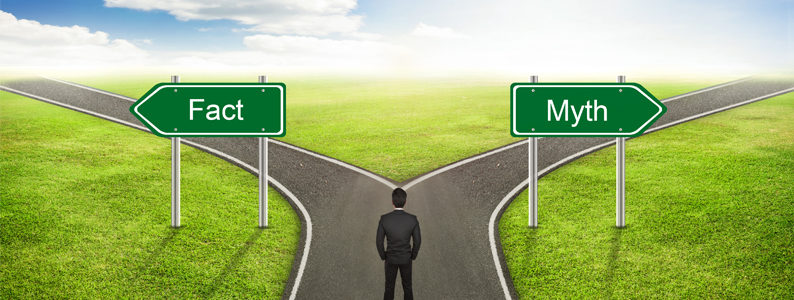
As men age, the male prostate enlarges naturally. Benign prostatic hyperplasia (BPH) is a condition that occurs when it enlarges to the point where it constricts the urethra, causing problems with urination. Symptoms occur because, due to the growth of the prostate gland, the bladder struggles to squeeze out urine and has more difficulty emptying itself. These symptoms can include:
- Increased frequency in urination or the sensation of needing to urinate
- Increased frequency of nighttime urination
- A weak urine stream that starts and stops
- Dribbling that occurs toward the end of urination
- Straining during urination
- Difficulty emptying the bladder completely
BPH is so widespread that it affects as many as 90 percent of men over age 70. Among the remedies used to treat it are lifestyle changes, medication and surgery. While BPH is extremely common, there are still some misconceptions about it.
Below, please find ten debunked myths:
MYTH 1: BPH and prostate cancer are linked.
FACT: BPH is a noncancerous condition, although a patient may experience both BPH and prostate cancer at the same time.
MYTH 2: BPH can lower the chances of developing prostate cancer.
FACT: BPH plays no role in the likelihood of prostate cancer development. The two conditions are completely unrelated. Treatment of BPH does not lower the risk of developing prostate cancer.
MYTH 3: BPH will lead to other prostate issues.
FACT: BPH simply refers to an enlargement of benign cells surrounding the prostate gland. There is no data supporting the notion that it will lead to further problems with the prostate.
MYTH 4: The bigger the prostate, the worse the symptoms.
FACT: The size of the prostate does not affect the severity of symptoms. Men with a slight enlargement can experience extreme symptoms, while others can experience minor symptoms with a prostate that’s incredibly enlarged.
MYTH 5: Only older men get BPH.
FACT: Although over half of men age 51+ will face BPH, it can develop before then. Fifty-one is merely the age at which it becomes more predominant (although men under age 40 rarely experience symptoms).
MYTH 6: BPH must be medically treated.
FACT: If you have BPH but do not experience symptoms such as frequent urination, dribbling or an inability to empty the bladder completely, you do not need to seek treatment.
MYTH 7: Changes in diet and lifestyle won’t really improve symptoms.
FACT: Changes in diet and exercise can alleviate symptoms. Exercise, stress reduction, Kegel exercises, the avoidance of certain medications and a healthy diet can be effective in symptom reduction.
MYTH 8: Too much or too little sex causes BPH.
FACT: There is no evidence to support the notion that any amount of sex affects the chances of developing BPH.
MYTH 9: The side effects from BPH medication are disruptive to your lifestyle.
FACT: Not everyone experiences side effects, and for those who do, there are ways to address them. Erectile dysfunction medicine like Cialis, for example, can combat the possible side effects from certain BPH medications that can cause sexual issues for some men.
MYTH 10: Surgery for BPH is complicated and has short-term success.
FACT: The two most common surgeries for BPH – one which unblocks the urethra, the other which eliminates tissue that blocks urine flow – require only a day or two in the hospital, followed by gradual home recovery. In certain cases, results can last up to 15 years.
Meet the BPH Specialists
At Partners In Urology, we treat BPH and other urologic conditions. With over 25 years of experience, we put our patients first, treating them with the utmost respect, care and compassion.

